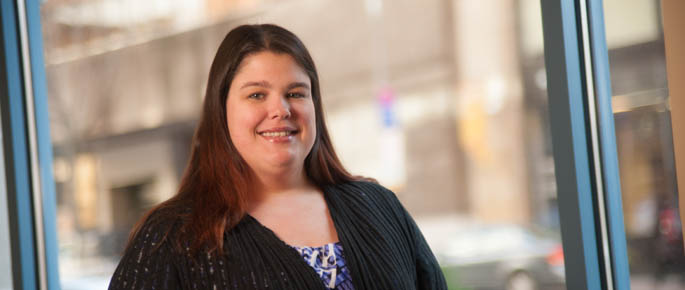Faculty Profile: Meet Sarah Schulz, Ph.D., Assistant Professor of Behavioral Science Thursday, February 13, 2014

Sarah Schulz, Ph.D., was recently appointed assistant professor of behavioral science at Point Park University. Prior to joining Point Park, Schulz worked as a high-risk care manager at UPMC's Community Care Behavioral Health, where she was responsible for managing behavioral health care benefits for Medicaid and Medicare recipients. While pursuing her doctorate, Schulz worked as a clinical review specialist at Alta Bates Medical Center in Berkeley, California.
How did you become interested in the social work field?
I always like to say that I didn't choose social work as a career, but that social work chose me. I have always enjoyed helping people and learning about human behavior, and when I was an undergraduate at the University of Pittsburgh I learned that social work was a career where I could focus on the micro-level interactions with members of marginalized communities while simultaneously fighting for social justice at the macro level. As I progressed through the program and went on to pursue my M.S.W., I thoroughly enjoyed my fieldwork opportunities in interesting and challenging settings such as inpatient mental health and criminal justice facilities. I learned firsthand that there is much that needs to be changed about our health and social welfare systems, and felt that social work was the profession that would allow for me to address systemic inequalities while embracing a strengths-perspective in working with individuals with mental health concerns.
Why did you choose to teach at Point Park University?
Growing up in Pittsburgh, I had always known Point Park to be a "theatre arts" school, but was excited to find out that there is a growing behavioral sciences program housed within the Humanities and Human Sciences department. This unique opportunity for interdisciplinary collaboration with colleagues from programs such as psychology, English and global cultural studies was one of the reasons that I chose Point Park. I was also excited to join an academic community where a commitment to diversity and academic excellence were emphasized and compatible with my own personal and professional values.
Why is teaching your passion?
I am grateful for the opportunity to bring my 10 years of practice experience in the behavioral health field to the classroom setting, where I can help to prepare students for a dynamic career regardless of their area of interest. I also feel passionately about issues of social justice, and the classroom is an excellent environment to encourage students to "think big and dream big" while envisioning change for the future. I also appreciate the challenge of using interesting, relevant and engaging strategies for teaching students about social change and contemporary issues faced by helping professionals.
What advice do you have for our behavioral science majors?
My advice for any new behavioral science student or professional is first to keep an open mind about where your career path may take you. When I entered the profession, I was originally interested in the field of domestic violence, but I ended up being offered and accepting an internship in an inpatient mental health facility, which took my career in an unexpected but exciting direction toward the realm of mental health treatment.
Also, regardless of your area of focus, you should anticipate challenges working within what is a very broken system; however, being able to rise above these challenges and reach out to and connect with clients in need is well worth the struggle.
I would also encourage anyone in the helping professions to always be mindful of the need to practice self-care. Burnout in the helping professions is a serious concern, and taking time for oneself is key to having a happy and healthy career. Balance is important; figure out what activity brings you joy and helps reduce your stress level, and practice it regularly!
More About: behavioral sciences, UPMC, faculty

